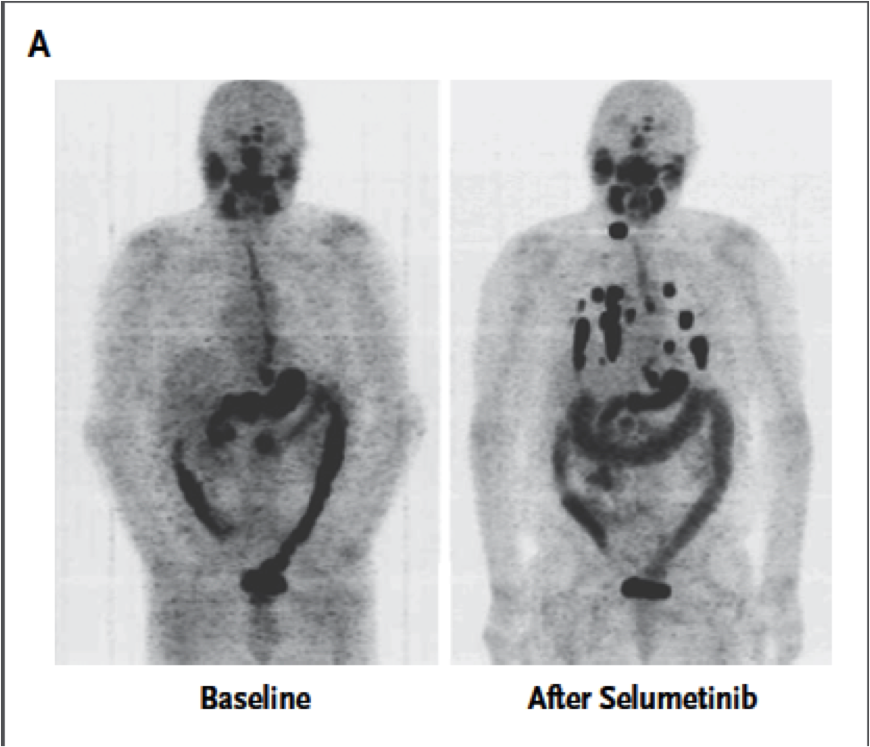
Differentiated Thyroid Cancer Therapy Patient Preparation
Withdraw thyroid medications. In the case of Thyroxine (T4) for 4 weeks and T3 for 2 weeks. TSH should be equal or above 30 uUI/ml. Avoid recent ingestion of foods rich in iodine content (Salt, Shellfish) for 4-7 days (See allowed and forbidden food). Salt may contain 1 part of iodine/100.000 parts of sodium chlorine (2-6/39.000 indicated in some salt labels). Ideally when the body is depleted of iodine, urinary concentration is below 50-100 ug/L after 24 h collection. Note that if urinary concentration is > 300 ug/L means excess of body iodine content. Normally 80% of the daily intake of iodine is excreted in the urine. Likewise, avoid use of contrast material in previous weeks. Large amounts of iodine (up to 30.000.000 ug) may be administered in a single procedure. If amiodarone was taken previously by the patient, it also provides a large amount of iodide. It has been demonstrated that rTSH given as described below may be helpful to increase RAIU up to more than 90% and so avoid posponing the radioiodine therapy in spite of increased iodine urinary excretion (4).
It is also critical to make sure that TSH is equal or above 30 uUI/ml.
In order not to withdraw thyroid replacing hormone and avoid hypothyroid symptoms, two protocols have been used to stimulate the thyroid. One with bovine TSH and the other one with a synthetic product, detailed below.
1) TSH (Bovine Thyroid Stimulating Hormone):
- 10 uIU im x 3 days, prior to radioiodine therapy.
2) Thyrogen (Recombinant Thyroid Stimulating Hormone) Package Insert :
- 0,9 mg im every 24h x 2 doses, prior to radioiodine therapy.
or
- 0,9 mg im every 72h x 3 doses, prior to radioiodine therapy.
It is important that radioiodine be given 24 h after the last rTSH dose.
In fertile females rule out pregnancy with subBeta GCH test.
Patient must fast 4-6 h before receiving 131-I orally and wait 3h before resuming any food ingestion. The diet must be iodine free for 2-3 additional days.
Selumetinib produces clinically meaningful increases in iodine uptake and retention in a subgroup of patients with thyroid cancer that is refractory to radioiodine; the effectiveness may be greater in patients with RAS-mutant disease. See image wich shows increase of iodine foci.

1 Jairo Wagner, Anneliese F. Thom, Lilian Yuri Itaya Yamaga. Tratamiento del Cancer Diferenciado del Tiroides con Radio Yodo, P: 193 -201 In: Medicina Nuclear Aplicaciones Clínicas. Eds: I. Carrio - P. González. Editorial Masson, Barcelona España, 2003.
2 Meier D.A. et al. Therapy of Thyroid Disease with Iodide-131 (Sodium Iodide) V1.0 Society of Nuclear Medicine Procedure Guideline. 2002: 1-11.
3 Park HM, The Thyroid Gland in Henkin RE et al. Nuclear Medicine. Mosby St Louis 1996, p 836.
4 Lawrence JE, Emerson CH, Sullaway SL, Braverman LE. The effect of recombinant human TSH on the thyroid (123) I uptake in iodide treated normal subjects. J Clin Endocrinol Metab. 2001 Jan;86(1):437-40.
5 Ho AL, Grewal RK, Leboeuf R, et al. Selumetinib-Enhanced Radioiodine Uptake in Advanced Thyroid Cancer. The New England journal of medicine. 2013;368(7):623-632. doi:10.1056/NEJMoa1209288.